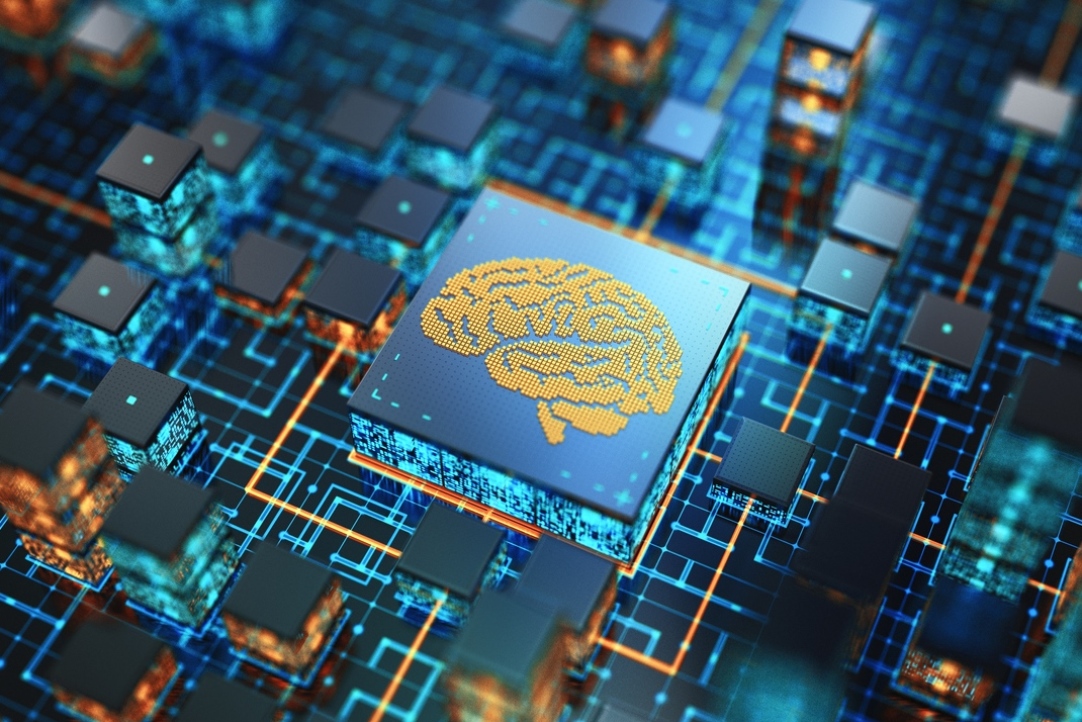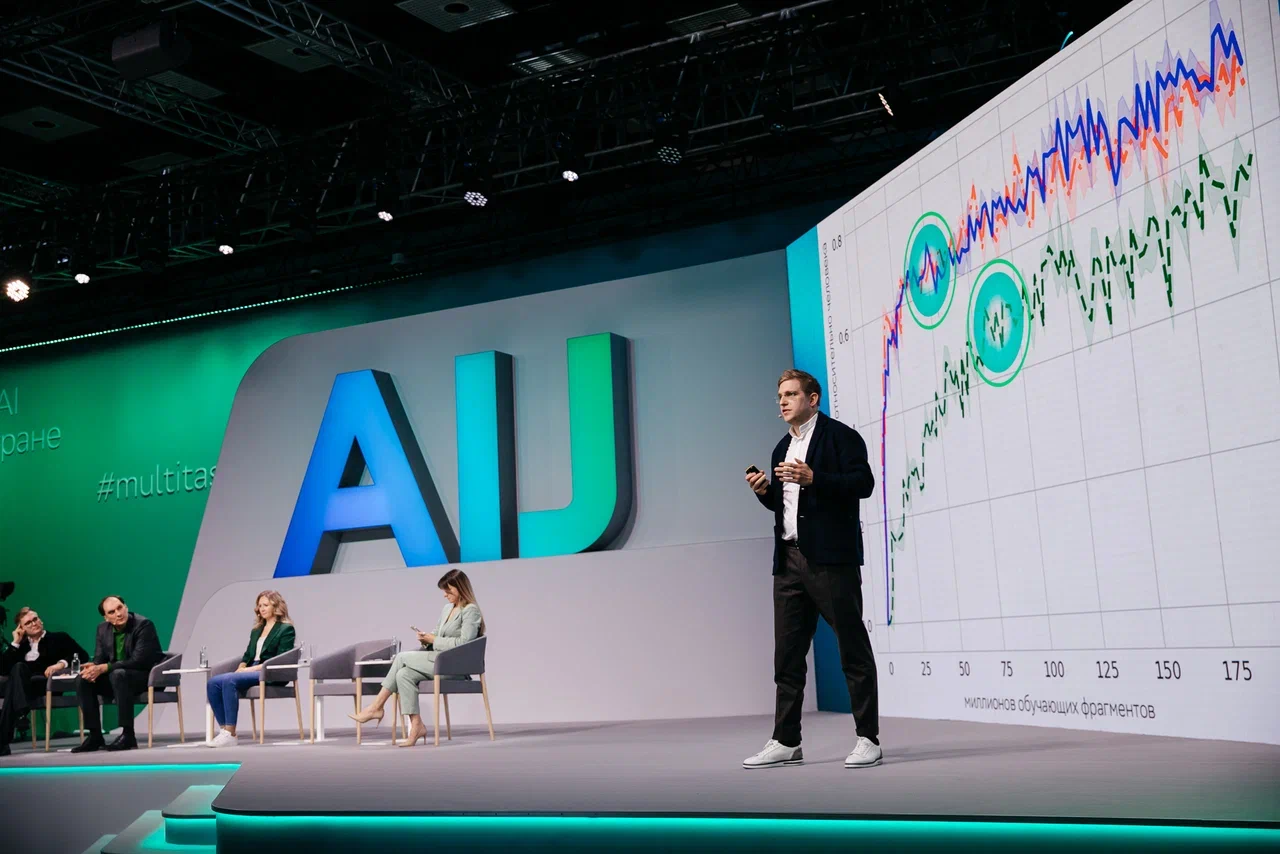HSE Researchers Contribute to Artificial Intelligence Journey Conference

The AI Journey international conference is a major platform for sharing cutting-edge innovations in artificial intelligence and machine learning. In late November 2022, AIJ was once again hosted by Sber. The conference was attended by HSE researchers from the Faculty of Computer Science and the Centre for Artificial Intelligence.
The conference featured talks by leading industry experts and representatives of government, business and academia. This year, the central topic was 'How can science use AI to contribute to the development of business and government?' This and other topics were addressed at high-level meetings attended by President Putin and Deputy Prime Minister Chernyshenko.
Researchers from HSE’s AI Centre and Faculty of Computer Science (FCS) made the following presentations as part of the keynote talks, short talks and workshops:
Surprising Properties of Loss Landscape in Over-parameterised Models (Dmitry Vetrov)
From Dirichlet to Rubin: Optimistic Exploration in RL without Bonuses (Alexey Naumov)
Tensor Decompositions and Their Application to Control Singular Values of Convolutional Layers (Maxim Rakhuba)
Optimisation of Equipment Design Using Machine-Learning Methods (Denis Derkach)
Latent Neural Stochastic Differential Equations for Change Point Detection (Mikhail Hushchin)
Application of Transformers for Sequences in Bioinformatics (Maria Poptsova)
What Don’t We Understand About Deep Learning? (Evgeny Sokolov)
Machine Learning for Text Classification (Margarita Burova)
Ilya Kuzminov, Director of the HSE Centre for Strategic Analysis and Big Data, gave a talk titled ‘iFORA System: Data Mining Success Cases to Achieve Global Sustainable Development Goals’.
The discussion 'Accelerating AI Research' was attended by the heads of all AI centres which received grants from the Russian government in 2021, including those based at HSE University, Skoltech, Innopolis, MIPT, ITMO, and ISP RAS. Each representative shared their centre's most notable achievements. Alexey Masyutin, Head of the HSE AI Centre, presented the success story of a project designed to facilitate early diagnosis of dyslexia in children (AI-enabled Diagnostic and Assistive Speech Technologies) and spoke about his centre's genomics research (AI in Bioinformatics). The attendees discussed some of the key aspects and trends in AI development, such as AI integration in industry, the need for feedback, ethical aspects, human resources, and engaging young people in AI projects.
Alexey Masyutin (left)

'Attending the AIJ conference allows one to keep up with the latest trends in artificial intelligence—not only in terms of academic and applied research, but also in terms of industry needs and government support measures. During a panel discussion with the heads of AI centres, we suggested a few growth points for AI technologies in Russia. These include setting up centres for independent validation of results and creating platforms where companies and public authorities can request AI-based solutions, while universities and research centres can post their proposals.'
As part of the discussion 'AI Technologies for Economic Growth', young scientists met with Russian President Vladimir Putin. During the discussion on the application of AI in various fields, he noted that in some areas, Russia is one step ahead on a global scale. Vladimir Putin thanked Russian scientists for their contribution to the development of science. Alexey Naumov (HSE), Ivan Oseledets (Skoltech), Anna Kalyuzhnaya (ITMO), Semyon Budyonny (AIRI), and Elena Sokolova (BEAC) took part in the discussion. Healthcare and bioinformatics were an important focus, as was the role of AI in improving people's quality of life. The participants also discussed the need for large-scale investments in domestic software development.
Alexey Naumov spoke about the importance of reinforcement learning, which is used for designing drones, automating industrial production, developing cooling systems for data centres, and many other purposes. Naumov stressed the urgency of supporting this area of R&D.
Alexey Naumov

'Today, we are developing reinforcement learning technology in Russia. There is no doubt that more researchers should be involved in this area of work (including undergraduate and doctoral students) and a large number of engineers need to be trained, because running algorithms on drones and robots would be impossible without skilled engineers. Reinforcement learning can help automate production, reduce costs, and make road traffic safer in the long run with smart self-driving cars and taxis.
As part of the federal project 'Artificial Intelligence', the Ministry of Economic Development has supported the creation of AI research centres to continue until 2024. The work that I presented to the head of state was prepared by one such centre: the HSE AI Centre. This initiative is highly relevant. We have asked the Russian government to extend their support for this undertaking until 2030 and also to sponsor the opening of new research centres to focus on promising and emerging areas of artificial intelligence.'
Alexey Naumov, alongside Dmitry Vetrov, Assistant Professor of the HSE Faculty of Computer Science, and Sergey Samsonov, FCS Doctoral Student, received the 2022 Ilya Segalovich Award in November.
A collection of papers from the AIJ Conference will be published, including articles by the HSE AI Centre researchers.
See also:
Virtual Mozart, Venture Capital Bot, and Educational Video Generation: How AI is Used at HSE University
In mid-November, HSE University hosted a meetup where faculty, researchers, and administrators presented their projects and shared experiences with using AI technologies in education and research. The meeting was part of the continuing professional development programme 'Artificial Intelligence in Education and Research.'
‘In the Future, I Expect Rapid Development of Professions Related to Prompt Engineering’
The English-language programme of HSE Online ‘Master of Computer Vision’ will change its name to ‘Artificial Intelligence and Computer Vision’ in 2024. Andrey Savchenko, the programme academic supervisor, shares how the new name will affect the programme semantics, why AI has become the main federal trend in the field of information technology, and what tasks graduates will solve.
Artificial Intelligence as a Driver of Digital Transformation
In December, the HSE Institute for Statistical Studies and Economics of Knowledge and the HSE AI Research Centre participated in UNCTAD eWeek to discuss the future of the emerging digital economy. One of the topics discussed during the conference was artificial intelligence and its applications in driving the digital transformation of industry sectors. The session was co-organised by HSE University.
HSE University Receives Highest Grant under Priority 2030 Programme
HSE University has proved its leading position in the first group of the ‘Research Leadership’ field under the Priority 2030 programme. The university has also received the highest grant for teaching digital competencies to students, demonstrating its educational leadership in the fields of digital technologies and AI.
‘The Future Lies with AI Technologies and HSE University Understands That’
At the AI Journey 2023 international conference in Moscow, a ranking of Russian universities that train the best AI specialists was published. HSE University entered the A+ leadership group, taking first place according to such criteria as ‘Demand for hiring graduates’, ‘Quality of educational environment’, and ‘Activities for the development of school education’. Ivan Arzhantsev, Dean of HSE University’s Faculty of Computer Science, spoke to the HSE News Service about how AI specialists are trained at HSE University and what plans the university has in this area.
‘Every Article on NeurIPS Is Considered a Significant Result’
Staff members of the HSE Faculty of Computer Science will present 12 of their works at the 37th Conference and Workshop on Neural Information Processing Systems (NeurIPS), one of the most significant events in the field of artificial intelligence and machine learning. This year it will be held on December 10–16 in New Orleans (USA).
Specialists from the HSE Institute of Education Confirm GigaChat’s Erudition in Social Sciences
A multimodal neural network model by Sber, under the supervision of HSE University’s expert commission, has successfully passed the Unified State Exam in social studies. GigaChat completed all exam tasks and scored 67 points.
HSE University Students Win in the AIJ Science Competition at AI Journey 2023
The International Sber Conference of Artificial Intelligence, ‘AI Journey 2023’ recently took place in Moscow. Alexander Rogachev, doctoral student of the HSE Faculty of Computer Science, and Egor Egorov, an HSE 4th-year undergraduate student became the winners of the AIJ Science competition for scientific articles on artificial intelligence that was held as part of the event. The research was carried out under the umbrella of the HSE's Laboratory of Methods for Big Data Analysis (LAMBDA).
HSE University Hosts Fall into ML 2023 Conference on Machine Learning
Over three days, more than 300 conference participants attended workshops, seminars, sections and a poster session. During panel discussions, experts deliberated on the regulation of artificial intelligence (AI) technologies and considered collaborative initiatives between academic institutions and industry to advance AI development through megaprojects.
Child Ex Machina: What Artificial Intelligence Can Learn from Toddlers
Top development teams around the world are trying to create a neural network similar to a curious but bored three-year-old kid. IQ.HSE shares why this approach is necessary and how such methods can bring us closer to creating strong artificial intelligence.


